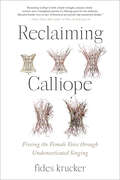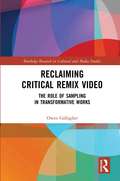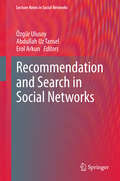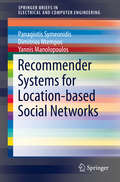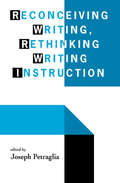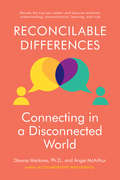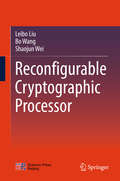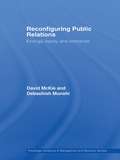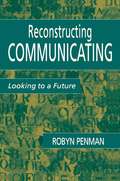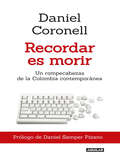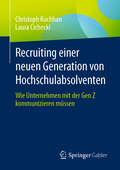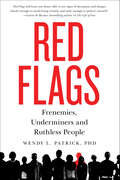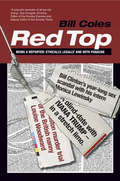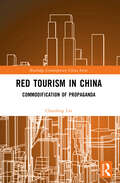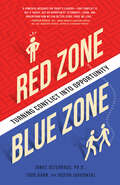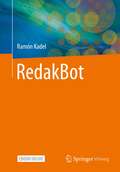- Table View
- List View
Reclaiming Calliope: Freeing the Female Voice through Undomesticated Singing
by Fides KruckerThe practice and politics of the unfettered female voice--reclaiming your power through voice, song, and opera-inspired exercises.For centuries, opera has used women&’s voices to convey male stories. Within an art form dominated by men, the female voice is a means to an end: controlled, denatured, and crafted to carry words and intentions that belie the true depth and complexity of the female experience.Here, author and opera singer Fides Krucker shows readers what it means to find--and use--our authentic voice, to sing wildly and uninhibited from the depths of our bodies and spirits. Part memoir, part radical vocal guide, and part feminist call to action, Reclaiming Calliope offers an intriguing look at the rarified world of opera, with fascinating behind-the-scenes details to which outsiders don&’t typically have access. Through incisive critique, personal stories, and intriguing exposé, Krucker razes the male gaze that packaged characters like Carmen, Tosca, and La Traviota&’s Violetta for viewer consumption--and radically envisions an empowered, new way of finding and fueling the authentic female voice.Through a series of breathing and vocal prompts that anyone--not just singers--can do, Krucker helps readers reconnect to their authentic primal voices: she takes the reader inside her vocal studio to learn new methods of breath, voicework, and embodiment to uncover and access personal and social truths. Each chapter includes a theme-related exercise--an act of expression, release, self-discovery, or resistance--that guides readers to develop voices unbound from anyone else&’s storytelling, boldly and without apology.
Reclaiming Critical Remix Video: The Role of Sampling in Transformative Works (Routledge Research in Cultural and Media Studies)
by Owen GallagherRemix is now considered by many to be a form of derivative work, but such generalizations have resulted in numerous non-commercial remixes being wrongfully accused of copyright infringement. Gallagher argues, however, that remix is a fundamentally transformative practice. The assumption that cultural works should be considered a form of private property is called into question in the digital age; thus, he proposes an alternative system to balance the economic interests of cultural producers with the ability of the public to engage with a growing intellectual commons of cultural works. Multimodal analyses of both remixed and non-remixed intertextual work, with a particular focus on examples of critical remix video, fuel the discussion, synthesizing a number of investigative methods including semiotic, rhetorical and ideological analysis.
Recollecting Lotte Eisner: Cinema, Exile, and the Archive (Feminist Media Histories #3)
by Naomi DeCellesRecollecting Lotte Eisner provides the first in-depth examination of the remarkable transnational career of film journalist, archivist, and historian Lotte Eisner (1896–1983). From her early years as a film critic in interwar Berlin to her escape from prison in occupied France and from her role as chief curator at the Cinémathèque française to that as the mythic "collective conscience" of New German Cinema, Eisner was a prolific writer and lecturer and a pivotal voice in early film and media studies. Situated at the juncture of feminist media historiography and disciplinary intellectual history, this groundbreaking book is based on extensive multilingual archival research and the excavation of a rich corpus of previously overlooked materials. Introducing samples of Eisner's writing in translation, this volume makes some of the most important contributions of a foundational scholar in the field of film studies accessible for the first time to an English-language readership.
Recommendation and Search in Social Networks
by Özgür Ulusoy Abdullah Uz Tansel Erol ArkunThis edited volume offers a clear in-depth overview of research covering a variety of issues in social search and recommendation systems. Within the broader context of social network analysis it focuses on important and up-coming topics such as real-time event data collection, frequent-sharing pattern mining, improvement of computer-mediated communication, social tagging information, search system personalization, new detection mechanisms for the identification of online user groups, and many more. The twelve contributed chapters are extended versions of conference papers as well as completely new invited chapters in the field of social search and recommendation systems. This first-of-its kind survey of current methods will be of interest to researchers from both academia and industry working in the field of social networks.
Recommender Systems for Location-based Social Networks
by Panagiotis Symeonidis Dimitrios Ntempos Yannis ManolopoulosOnline social networks collect information from users' social contacts and their daily interactions (co-tagging of photos, co-rating of products etc. ) to provide them with recommendations of new products or friends. Lately, technological progressions in mobile devices (i. e. smart phones) enabled the incorporation of geo-location data in the traditional web-based online social networks, bringing the new era of Social and Mobile Web. The goal of this book is to bring together important research in a new family of recommender systems aimed at serving Location-based Social Networks (LBSNs). The chapters introduce a wide variety of recent approaches, from the most basic to the state-of-the-art, for providing recommendations in LBSNs. The book is organized into three parts. Part 1 provides introductory material on recommender systems, online social networks and LBSNs. Part 2 presents a wide variety of recommendation algorithms, ranging from basic to cutting edge, as well as a comparison of the characteristics of these recommender systems. Part 3 provides a step-by-step case study on the technical aspects of deploying and evaluating a real-world LBSN, which provides location, activity and friend recommendations. The material covered in the book is intended for graduate students, teachers, researchers, and practitioners in the areas of web data mining, information retrieval, and machine learning.
Reconceiving Writing, Rethinking Writing Instruction
by Joseph PetragliaTo a degree unknown in practically any other discipline, the pedagogical space afforded composition is the institutional engine that makes possible all other theoretical and research efforts in the field of rhetoric and writing. But composition has recently come under attack from many within the field as fundamentally misguided. Some of these critics have been labelled "New Abolitionists" for their insistence that compulsory first-year writing should be abandoned. Not limiting itself to first-year writing courses, this book extends and modifies calls for abolition by taking a closer look at current theoretical and empirical understandings of what contributors call "general writing skills instruction" (GWSI): the curriculum which an overwhelming majority of writing instructors is paid to teach, that practically every composition textbook is written to support, and the instruction for which English departments are given resources to deliver. The vulnerability of GWSI is hardly a secret among writing professionals and its intellectual fragility has been felt for years and manifested in several ways: * in persistently low status of composition as a study both within and outside of English departments; * in professional journal articles and conference presentations that are growing both in theoretical sophistication and irrelevance to the composition classroom; and * in the rhetoric and writing field's ever-increasing attention to nontraditional sites of writing behavior. But, to date, there has been relatively little concerted discussion within the writing field that focuses specifically on the fundamentally awkward relationship of writing theory and writing instruction. This volume is the first to explicitly focus on the gap in the theory and practice that has emerged as a result of the field's growing professionalization. The essays anthologized offer critiques of GWSI in light of the discipline's growing understanding of the contexts for writing and their rhetorical nature. Writing from a wide range of cognitivist, critical-theoretical, historical, linguistic and philosophical perspectives, contributors call into serious question basic tenets of contemporary writing instruction and provide a forum for articulating a sort of zeitgeist that seems to permeate many writing conferences, but which has, until recently, not found a voice or a name.
Reconceptualising Multilingualism on African Radio: Language and Identity
by Gilbert Motsaathebe Limukani MatheThis book redefines multilingualism via the concept of radio in Africa. Africa presents unique challenges of lingual diversity which the media still struggles to accommodate, particularly when it comes to indigenous languages. Contributors argue that the linguistic realities of African radio reflect ethnic co-existence and fluidity of identity in pre-colonial, colonial and post-colonial contexts. They argue that communities consist of several “majorized” and “minoritized” indigenous languages which, if closely analysed, reflect a commonality of multilingualism. The book also suggests practical measures through which linguistic co-existence could be achieved and explores cases that redefine, reconceptualize and reframe multilingualism on African radio.
Reconcilable Differences: Connecting in a Disconnected World
by Dawna Markova Angie McarthurA remarkable new way to move beyond biases and blind spots (especially if you don’t think you have any!) so you can communicate more effectively with a friend, lover, relative, or colleague You know what it feels like to be “at odds” with someone. Sometimes it seems like you are speaking completely different languages. Cognitive neuroscientist Dr. Dawna Markova and communication expert Angie McArthur have spent years developing and implementing tools to help people find common ground. In Reconcilable Differences, they provide the strategies you need to bridge the gap at the heart of your differences with others. Each of us possesses rational intelligence: the capacity to divide information into discrete categories, processes, and logical steps. But you may not realize that the secret to building bridges between people lies hidden in your relational intelligence: the way you communicate, understand, learn, and trust. Reconcilable Differences shows you how to map mind patterns (the secret to pinpointing communication pitfalls) and identify thinking talents (the catalysts for peak performance). You will gain insights into how you learn in order to turn doubt into trust and uncertainty into productive engagement. Brimming with anecdotes and advice not only from the authors’ files but also from their own experiences as a mother- and daughter-in-law who are like night and day, Reconcilable Differences is your guidebook for making profoundly positive change with those you care about.Advance praise for Reconcilable Differences “Reconcilable Differences offers an inspiring way to bridge differences with someone you care about. It will help you identify and improve your relational intelligence, and become a better communicator in the process.”—Deepak Chopra, co-author of You Are the Universe: Discovering Your Cosmic Self and Why It Matters “Dawna Markova and Angie McArthur offer an extremely insightful road map to navigating the diverse ways each of us approaches making ourselves understood, as well as the way we tend to hear others. The insights and strategies herein are simple and elegant. The advice is as invaluable for success at work as it is for success in life.”—Peter Sims, founder and CEO, Parliament, Inc., and author of Little Bets: How Breakthrough Ideas Emerge from Small Discoveries “True communication begins with understanding yourself and the way you are being understood. This book is a powerful guide to self-analysis and bridge-building.”—Suzy Amis Cameron, co-founder, the MUSE School
Reconciling Indigenous Peoples’ Individual and Collective Rights: Participation, Prior Consultation and Self-Determination in Latin America (Indigenous Peoples and the Law)
by Jessika EichlerThis book critically assesses categorical divisions between indigenous individual and collective rights regimes embedded in the foundations of international human rights law. Both conceptual ambiguities and practice-related difficulties arising in vernacularisation processes point to the need of deeper reflection. Internal power struggles, vulnerabilities and intra-group inequalities go unnoticed in that context, leaving persisting forms of neo-colonialism, neo-liberalism and patriarchalism largely untouched. This is to the detriment of groups within indigenous communities such as women, the elderly or young people, alongside intergenerational rights representing considerable intersectional claims and agendas. Integrating legal theoretical, political, socio-legal and anthropological perspectives, this book disentangles indigenous rights frameworks in the particular case of peremptory norms whenever these reflect both individual and collective rights dimensions. Further-reaching conclusions are drawn for groups ‘in between’, different formations of minority groups demanding rights on their own terms. Particular absolute norms provide insights into such interplay transcending individual and collective frameworks. As one of the founding constitutive elements of indigenous collective frameworks, indigenous peoples’ right to prior consultation exemplifies what we could describe as exerting a cumulative, spill-over and transcending effect. Related debates concerning participation and self-determination thereby gain salience in a complex web of players and interests at stake. Self-determination thereby assumes yet another dimension, namely as an umbrella tool of resistance enabling indigenous cosmovisions to materialise in the light of persisting patterns of epistemological oppression. Using a theoretical approach to close the supposed gap between indigenous rights frameworks informed by empirical insights from Bolivia, the Andes and Latin America, the book sheds light on developments in the African and European human rights systems.
Reconfigurable Active and Passive Planar Antennas for Wireless Communication Systems (Signals and Communication Technology)
by Shiban Kishen Koul Rajesh K. SinghThis book presents state-of-the-art trends in reconfigurable active and passive planar antennas and their applications in wireless communication systems operating in the frequency band 5-6 GHz. Due to various key features such as multifunction antenna design, compactness, planar nature, and low cost, these technologies are becoming popular for current and future wireless applications. This book discusses different novel antenna designs and their working principles in detail. The modern and future wireless systems require wideband antennas to accommodate various channels in a single band or in separate bands. The carrier aggregation (CA) has been introduced in the modern wireless systems such as LTE-advanced systems and 5G./6G. In CA, a device can use several channels for transmission and reception. The used channels can exist in the same frequency band (intra-band CA) or in distinct bands (inter-band CA). To accommodate more channels, more bandwidth is required within the operating band. For portable devices, circularly polarized (CP) antennas are more advantageous over linearly polarized antennas since in CP antennas, there is low risk of misalignment and, hence encountering interference. Circularly polarized antenna also provides higher link reliability for the portable devices. To provide high data rates, more bandwidth is needed to accommodate more channels. Various multifunction, compact, and wideband antennas for plethora of applications are addressed in detail in this book. The scope of developing reconfigurable active antennas for application in beam switching, beam steering, wireless charging, security systems, etc., is described. This book concludes by giving glimpses of antenna requirements for future wireless communication systems.
Reconfigurable Cryptographic Processor
by Bo Wang Leibo Liu Shaojun WeiThis book focuses on the design methods for reconfigurable computing processors for cryptographic algorithms. It covers the dynamic reconfiguration analysis of cryptographic algorithms, hardware architecture design, and compilation techniques for reconfigurable cryptographic processors, and also presents a case study of implementing the reconfigurable cryptographic processor “Anole” designed by the authors’ team. Moreover, it features discussions on countermeasures against physical attacks utilizing partially and dynamically reconfigurable array architecture to enhance security, as well as the latest trends for reconfigurable cryptographic processors. This book is intended for research scientists, graduate students, and engineers in electronic science and technology, cryptography, network and information security, as well as computer science and technology.
Reconfigurable Intelligent Surface-Empowered 6G (Wireless Networks)
by Zhu Han Lingyang Song Hongliang Zhang Boya DiThis book presents novel RIS-Based Smart Radio techniques, targeting at achieving high-quality channel links in cellular communications via design and optimization of the RIS construction. Unlike traditional antenna arrays, three unique characteristics of the RIS will be revealed in this book. First, the built-in programmable configuration of the RIS enables analog beamforming inherently without extra hardware or signal processing. Second, the incident signals can be controlled to partly reflect and partly transmit through the RIS simultaneously, adding more flexibility to signal transmission. Third, the RIS has no digital processing capability to actively send signals nor any radio frequency (RF) components. As such, it is necessary to develop novel channel estimation and communication protocols, design joint digital and RIS-based analog beamforming schemes and perform interference control via mixed reflection and transmission. This book also investigates how to integrate the RIS to legacy communication systems. RIS techniques are further investigated in this book (benefited from its ability to actively shape the propagation environment) to achieve two types of wireless applications, i.e., RF sensing and localization. The influence of the sensing objectives on the wireless signal propagation can be potentially recognized by the receivers, which are then utilized to identify the objectives in RF sensing. Unlike traditional sensing techniques, RIS-aided sensing can actively customize the wireless channels and generate a favorable massive number of independent paths interacting with the sensing objectives. It is desirable to design RIS-based sensing algorithms, and optimize RIS configurations. For the second application, i.e., RIS aided localization, an RIS is deployed between the access point (AP) and users. The AP can then analyze reflected signals from users via different RIS configurations to obtain accurate locations of users. However, this is a challenging task due to the dynamic user topology, as well as the mutual influence between multiple users and the RIS. Therefore, the operations of the RIS, the AP, and multiple users need to be carefully coordinated. A new RIS-based localization protocol for device cooperation and an RIS configuration optimization algorithm are also required. This book targets researchers and graduate-level students focusing on communications and networks. Signal processing engineers, computer and information scientists, applied mathematicians and statisticians, who work in RIS research and development will also find this book useful.
Reconfigurable Intelligent Surface-Enabled Integrated Sensing and Communication in 6G (Wireless Networks)
by Mugen Peng Caijun Zhong Xiaoling Hu Chenxi LiuAs the main trend and key enabling technology for next-generation wireless networks (i.e., 6G), integrated sensing and communication (ISAC) can effectively improve spectrum efficiency, hardware efficiency, and information processing efficiency. However, it faces several deficiencies, including limited coverage due to high-frequency signals and limited communication-sensing performance due to uncontrollable wireless environments. Reconfigurable intelligent surface (RIS) provides novel dimensions to address these deficiencies by intelligently manipulating the wireless propagation environment in an energy- and hardware-efficient manner. RIS-enabled ISAC is expected to comprehensively promote the multi-dimensional performance of 6G, such as communication capacity, sensing accuracy, and coverage. Nevertheless, to fully realize its potential, one needs to figure out the impacts of RIS on joint communication and sensing performance and tackle new technical challenges in beamforming design and signal processing. The goal of this book, therefore, is to deliver a thorough understanding of RIS-enabled ISAC from three perspectives: performance analysis, beamforming design, and signal processing. Specifically, the authors provide a brief introduction to RIS-enabled ISAC, including basic concepts, motivations, potential application scenarios, and an overview of the state-of-the-art research on RIS-enabled ISAC. The theoretical performance analytical frameworks of RIS-enabled ISAC and their corresponding results are also discussed. Based on this, several critical issues are identified and elaborated on, including signal processing technologies such as angle and Delay-Doppler information acquisition, and air interface technologies such as beamforming designs. Finally, the book concludes with future trends and open issues for further research.The book would be beneficial for researchers, graduate students, and industry professionals who wish to gain a comprehensive understanding of the latest developments and challenges in RIS-enabled ISAC. By providing insights into the potential of RIS-enabled ISAC and the technical challenges that need to be addressed, the book can aid in the development of practical solutions for next-generation wireless networks and contribute to the advancement of the field of wireless communications.
Reconfiguring Public Relations: Ecology, Equity and Enterprise (Routledge Advances In Management And Business Studies)
by David McKie Debashish MunshiInnovative and timely, this PR book is the first to address environmental questions within the context of global business. An excellent counterpoint to the existing US-oriented literature on this topic, here the authors set out ways to equip public relations to respond to and re-imagine itself in the light of current major forecasts and trends for
Reconsidering the History of South African Journalism: The Ghost of the Slave Press (Routledge Studies in the Modern History of Africa)
by Gawie BotmaThe concept of the “free press” is often celebrated as the vehicle which finally brought freedom of speech and democracy to post-apartheid South Africa, but historically, the position of the press was more complicated.This book dives into the history of slavery at the Cape between 1800 and 1838, reflecting on the fact that several founding journalists and printers were slave owners themselves and advertised slaves as regular “property” in their publications. The book presents an inclusive history of the founding of colonial newspapers and magazines, driven by the question of how we in the 21st century should make sense of the role that newspapers and journalism played at key points in the history of slavery and its aftermath. The “slave press” was a label originally attached to The Cape Town Gazette and African Advertiser when it was founded by a pair of well-connected private British slave traders.This book challenges us to confront the ghost of the slave press, and to consider the complicated history of press freedom in South Africa. This important book will be of interest to scholars and students of journalism and media history, in South Africa and beyond.
Reconstructing Communicating: Looking To A Future (Routledge Communication Series)
by Robyn PenmanIn this innovative and potentially controversial book, Penman examines the future of communication as a discipline. She foresees a time in which communicating is conceived as a social construction process, in the anticipation that this will allow a genuine practical response to contemporary social problems. The book sets out a map toward accomplishing that future--laying the foundations for a different way of conceiving of communication, enabling direct action, rather than just theorizing about it. It begins with a history illustrating how the communication discipline has arrived to where it is today and then goes on to demonstrate Penman's conception of communication. Reconstructing Communicating is an exploration of what it means to inquire into communicating; to treat communicating as the essential problematic of concern; and to recognize that we construct our reality in our communicating. In undertaking this exploration, the author pursues a central theme of what constitutes good communicating and good communication research. Arguments throughout this book provide a radical departure from mainstream communication studies and especially from the rationalist's quest for truth and scientific knowledge. A way of acting in good faith is offered, both with the process of communicating and with the participants in it, that generates practical understandings for constructing new futures. Designed for communication scholars and graduate students primarily in organizational communication, public relations, and communication theory, this book will also interest those in management and business as it deals with practical communication issues.
Recordar es morir: Un rompecabezas de la Colombia contemporánea
by Daniel Alfonso Coronell CastañedaUna antología de las mejores columnas de Daniel Coronell. "Recordar es morir reúne los mejores trabajos de Daniel Coronell para su columna de la revista Semana. Con temas como Agro Ingreso Seguro, Saludcoop, la Yidispolítica, las Chuzadas del DAS y el Palacio de Justicia, entre otros, el autor introduce a los lectores en la labor del periodista investigativo, revelando, por primera vez, detalles de cómo realiza su trabajo, el detrás de cámaras de sus pesquisas, así como su forma de entender y ejercer el periodismo. Muchos reprocharán a Coronell que se ocupe de la podredumbre nacional y no de ?tantas cosas buenas y bonitas que tiene nuestro lindo país. No es esa su misión. La suya consiste en destapar los abusos, única manera de poder corregirlos, así como el médico, para recobrar la salud del paciente, debe diagnosticar primero la enfermedad. Por eso insisto en que este no es un libro de recuerdos. Es una gran colonoscopia de la política colombiana". Daniel Samper Pizano
Recruiting einer neuen Generation von Hochschulabsolventen: Wie Unternehmen mit der Gen Z kommunizieren müssen
by Christoph Kochhan Laura CicheckiDieses Buch geht der Frage nach, wie Unternehmen Hochschulabsolventen aus der Generation Z gezielt ansprechen können, um sie als Mitarbeitende zu gewinnen. Die um die Jahrtausendwende geborene Gen Z gilt als idealistisch und durch Haltung getrieben, zuweilen aber auch als wählerisch, unmotiviert und sprunghaft; ein Job fürs Leben ist nur für die wenigsten der aktuellen Absolventen vorstellbar. Unternehmen müssen jedoch weiterhin Nachwuchs rekrutieren, um erfolgreich und produktiv zu bleiben, – aber sind sie auf die neuen Vorstellungen und Ansprüche der Gen Z vorbereitet? Das Autorenteam beantwortet in diesem Buch auf Basis einer umfassenden qualitativen Studie mit Studierenden und Unternehmensvertretern in der DACH-Region folgende Fragen: Wie erreichen Arbeitgeber die neue Generation der Hochschulabsolventen? Was macht erfolgreiches Personalmarketing in der Praxis heutzutage aus? Und: Wie wird sich die Arbeitswelt weiterentwickeln? Außerdem: Jo Dietrich, Co-Founder der Gen-Z-Agentur ZEAM, erläutert im Interview, wie Arbeitgebermarken für die Gen Z attraktiv werden, und gibt Praxistipps für u. a. Recruiting, Bewerbungsprozess sowie Social-Media-Auftritt.
Rectenna: Wireless Energy Harvesting System (Advances in Sustainability Science and Technology)
by Sachin Kumar Binod Kumar Kanaujia Neeta SinghThis book covers the theory, modeling, and implementation of different RF energy harvesting systems. RF energy harvesting is the best choice among the existing renewable energy sources, in terms of availability, cost, size, and integration with other systems. The device used for harvesting RF energy is called rectenna. A rectenna can work at the microwave, millimeter-wave, and terahertz waves. It also has the capability to operate at optical frequencies to be used for 6G and beyond communication systems. This book covers all aspects of wireless power transfer (WPT)/wireless energy harvesting (WEH), basics, theoretical concepts, and advanced developments occurring in the field of energy harvesting. It also covers the design theory for different types of antenna, rectifier, and impedance matching circuits used in RF energy harvesting systems. Different future and present applications, such as charging of vehicles, smart medical health care, self-driven e-vehicles, self-sustainable home automation system, and wireless drones, have also been discussed in detail.
Red Flags, Green Flags: Modern Psychology for Everyday Drama
by Dr Ali Fenwick‘A MODERN MANUAL FOR ACING ALL SOCIAL INTERACTIONS THAT WILL TEACH YOU HOW TO HANDLE THE TRICKIEST OF PEOPLE AND SITUATIONS' THOMAS ERIKSON, BESTSELLING AUTHOR OF SURROUNDED BY IDIOTS Discover the tools to identify healthy and toxic behaviours in all areas of life and separate the red flags from the green, from TikTok psychologist Dr Ali Fenwick---CRACK THE BEHAVIOURAL CODE BEHIND EVERYDAY DRAMAIs there a situation(ship) you can’t find your way out of?Do you wish you could spot toxic friendships from afar?Or maybe you feel like you’ve had enough of some people, but struggle to set boundaries?From gaslighting crushes and pushy parents to bosses that take credit for your work, Red Flags, Green Flags will transform how you interpret and handle any situation, leading you straight into a fuss-free existence.An internationally renowned psychologist and behavioural expert Dr Ali Fenwick is here to guide you through the most crucial red and green flags – unhealthy and healthy social conduct – and equip you with the psychological explanation behind each one. Improve your emotional intelligence and learn how to understand your own needs and expectations when it comes to relationship building.
Red Flags: Frenemies, Underminers and Ruthless People
by Wendy L. PatrickWe all need emotional blinders: the etiquette that keeps society smoothly moving depends on it. But when you absolutely must rely on another person, you have to be able to assess them objectively. In RED FLAGS, author Wendy L. Patrick shares simple strategies anyone can use to spot deceptive or downright dangerous people who use ingratiation and social convention to draw in and lull victims.Readers will learn how even the most skeptical of us use rose-colored lenses on those around us, in three sections:-Blinded by Desire-from the alluring lenses of attraction and positive attention to the blindness of marital "bliss" and the distorted lens of delusion-Overlooking Red Flags in a Professional Setting-how reassuring proximity and the false security of credibility and similarity can lead to costly mistakes -Be Afraid of What You Can't See-the ultimate cost of wearing emotional blinders around the truly disturbed/criminal, from sexual predation to domestic abuse, stalking and cyberstalking. Readers will learn how to:-avoid selective attention-observe people over time (bad guys rely on first impressions)-ask questions: most people's favorite topic is themselves-cybersleuth to verify information and track down inconsistenciesYou need this book if you:-want to know if a potential boyfriend is trustworthy-are interviewing or hiring new employees-are selecting anyone to take care of your children-are lending money or property-have partners in business
Red Top: Being a Reporter - Ethically, Legally and with Panache
by Bill ColesRed Top has everything an aspiring reporter needs to know about newspaper journalism. Written in easily digestible bite-size chapters, the book is packed with extraordinary stories that explain what it's really like to be a front-line reporter. Included is a full breakdown on the two key skills of how to interview and how to dig up exclusives. Plus tips on dealing with the mad-masters, the editors; writing a news story; and what the hell to do when a libel writ comes thudding onto your desk.Bill Coles has been a journalist for 25 years and was The Sun's New York Correspondent, Political Correspondent and Royal Reporter. He has written for a huge variety of papers from The Wall Street Journal to the Mail, the Scotsman and Prima Baby Magazine.He has also covered some of the world's biggest news stories - as well as some of the most bizarre --Bill Clinton's year-long sex scandal with his intern Monica Lewinsky.-The Boston murder trial of the British nanny Louise Woodward (with five Sun front pages in a row).-Buying $10,000 of lottery tickets in Miami-A blind-date with Ivana Trump - in a stretch limo.-Becoming one of Company magazine's Bachelors of the Year.-Flying from New York to the Inca trail in Peru - to eat a giant guinea-pig.-Posing naked for a Sun centrefold - with nothing but a copy of The Sun to hide his modesty.
Red Tourism in China: Commodification of Propaganda (Routledge Contemporary China Series)
by Chunfeng LinThis book analyzes the phenomenally profitable “Red Tourism” industry in China, in which visitors make pilgrimages to sites of historical significance to the Communist Party of China and the Chinese Revolution. The book examines Red Tourism in connection with the transforming power relations between the state and the private, communication in the socialist past, and the current round of capitalization, against the backdrop of the world’s second largest economy. By re-evaluating the conventional notion of propaganda through the lens of neutral xuanchuan propaganda, the book presents a nuanced look at the social space of Red Tourism, revealing that propaganda should be conceived as a commodity, an industry, or even a media system similar to the news media. Drawn from combining fieldwork and cultural analysis spanning a decade, this book will be of interest to students and scholars of communication studies, tourism, and Chinese politics.
Red Zone, Blue Zone: Turning Conflict into Opportunity
by James Osterhaus Joseph Jurkowski Todd HahnMost of us fear and dread conflict, at home or at work. But conflict can be your ally, not your enemy. Conflict doesn’t have to tear your family or organization apart.Using the story of a family business leader embroiled in generational conflict, Red Zone, Blue Zone shows how to navigate conflict in a way that is healthy and leads to enhanced relationships, self-awareness, and greater leadership success. Practical response activities and personal reflection questions help the reader understand the sources of conflict, have a working command of conflict navigation principles, and be equipped to help others navigate conflict in their own lives.In Red Zone, Blue Zone readers will learn skills such as:Questioning, ListeningPacingReframing
RedakBot
by Ramón KadelDer Journalismus ist im Wandel – nicht nur aufgrund des Medienstrukturwandels durch Digitalisierung und Internet, sondern auch aufgrund neuer Technologien, die erstmals sogar ein Stück weit die Existenzberechtigung des Berufsbilds infrage stellen. Werden Journalisten also durch künstliche Intelligenz ersetzt? Nein! Denn KI im Journalismus ist ein „Frenemy“: Freund und Feind zugleich. Freund, wenn man sich auf den KI-Journalismus vorbereitet, Feind für diejenigen, die ihr Mindset nicht ändern können und die neuen Technologien ausschließlich als Bedrohung sehen. Mit der Lektüre dieses Buches sollen Journalisten und Redakteure sowie Volontäre und Studenten im Bereich der Kommunikationswissenschaften konkrete Ideen im Kopf haben, wie sie sich auf die Zeit des KI-Journalismus erfolgreich vorbereiten. Es regt an, innovativ zu sein, und von den neuen Möglichkeiten, die redaktionelle Bots bieten, zu partizipieren – und schließlich zu profitieren. Die Frage ist nicht, ob „RedakBots“ unsere Arbeitswelt verändern, sondern wann dies passiert. Das Buch bereitet darauf vor.
